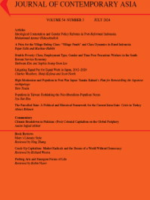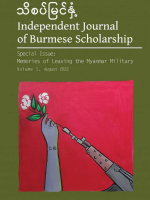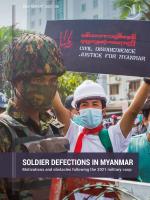The Great Escape – on how soldiers in Myanmar defect and join the resistance movement
In this Insight Myanmar podcast, DIIS senior researcher Helene Maria Kyed, talks about the defection movement in Myanmar since the 2021 military coup and how it constitutes a historical break with the past. Although desertions did take place prior to the coup, the act of defecting to the military opposition was very rare. Based on research findings on soldiers and police who have left the military to join the opposition since the coup, she talks about the motivations to leave and the challenges of doing so given the high security risks and the pervasive insular culture of the military. Kyed recalls how soldiers who decided to defect were disgusted by the physical violence inflicted on civilians after the coup, but she also notes how defected soldiers later revealed that lower ranks routinely endured similar abuses from seniors. Indeed, as more defected soldiers and their spouses tell their stories, Kyed notes that the inner workings of the military are coming to light as never before; for example, the systematic violence and exploitation of the lower ranks, and women becoming virtual slaves within the system.
Defections in Myanmar have been supported by the wider resistance movement as one among other strategies to quell military dictatorship and reduce military violence. Initially, defectors relied on individual strategies and were mostly on their own. However, the support structures put in place by defector groups, democracy activists, ethnic resistance organizations and the National Unity Government has stimulated a significant increase in defections, particularly during the latter half of 2021 as those structures became more effective and widespread. This support includes logistical and financial assistance, as well as moral encouragement. However, limited resources and lack of international funding also raises challenges for sustaining the lives of defectors.
In the Podcast, Kyed also paints a broader picture of defections beyond just the current moment of ending the conflict. It is also a critical component to the country’s eventual peace. “Even though there's still a conflict going on, defection is already part of questions of reintegration and questions of disarmament.” In other words, the process of dismantling the current military necessarily connects to the type of armed forces the Burmese people will want going forward, and what role, if any, members of the current military should play in its formation.
DIIS Experts





